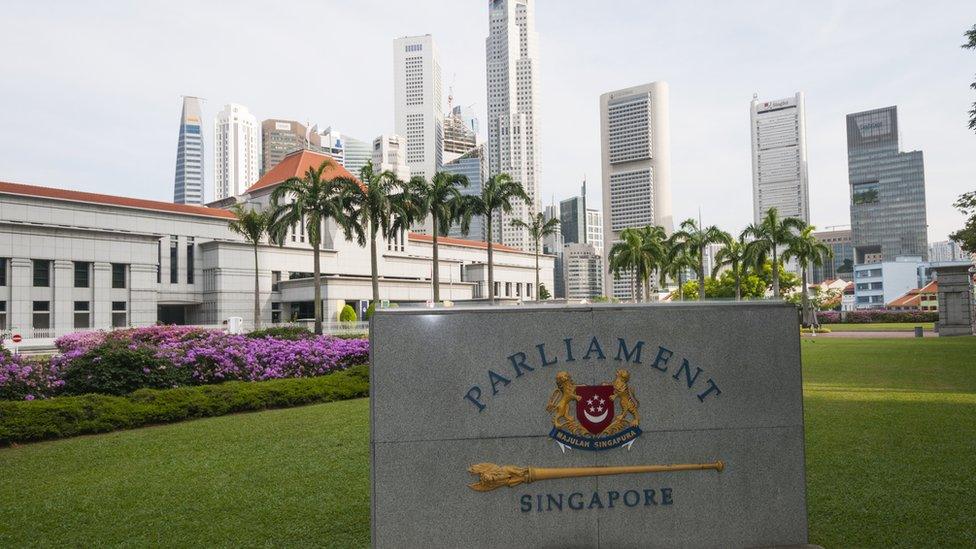Singapore passes controversial law to counter foreign interference
- Published

Critics of the new law have raised concerns over its broad scope and limits on judicial review
Singapore has passed a controversial law aimed at countering foreign interference in domestic affairs, in a move that critics say could be used to stifle dissent.
It allows authorities to order social media sites and Internet providers to disclose user information or block content that they deem hostile.
Singapore says such a law is needed to counter "serious threats".
The law was passed on Monday after 10 hours of heated parliamentary debate.
It will give the government powers to act against local proxies - people in Singapore that are deemed to have carried out "hostile information campaigns" on behalf of foreign entities.
The government can also designate organisations or individuals as "politically significant persons" if their work is directed towards a political end. This means they could be require to disclose their funding sources.
But the broad scope of the Foreign Interference (Countermeasures) Act, also known as Fica, has sparked concern.
"Today's passage of FICA constitutes a human rights disaster for community activists, independent media, and opposition politicians because it hands arbitrary power to the Singaporean government to punish anyone based on vague allegations of involvement with foreigners," Phil Robertson, deputy Asia director at Human Rights Watch, said in a statement.
"Using this law, the government can... shut down viewpoints it doesn't like. Once again, Singapore demonstrates how little faith it has in its democracy by resorting to political measures better suited to authoritarian regimes that don't trust their people."
Singapore has defended the need for such laws saying its multi-ethnic population made it more vulnerable to "hostile information campaigns [that would] mislead Singaporeans on political issues [or] stir up dissent and disharmony by playing up controversial issues such as race and religion".
Breaking this law could lead to a heavy fine or a jail term.
National implications
Fica allows the home affairs minister to order investigations in the public interest to "expose hostile information campaigns", based on suspicion of foreign interference.
An offence is committed if a person publishes something in Singapore on behalf of a foreign entity to "influence a target to do something that is or is likely to be prejudicial to Singapore's interests, incite feelings of hatred or diminish public confidence in the authorities", according to an earlier Straits Times report.
Instead of open court, an independent panel chaired by a judge will hear appeals against the minister's decisions. This is necessary as matters may involve sensitive intelligence with implications for national security, the government said.
"This Bill is intended to address a serious threat that concerns our national security and sovereignty," Law and Home Affairs Minister K. Shanmugam said.
"And these are important to ensure that Singaporeans continue to make our own choices on how we should govern our country and live our lives."
The small city-state joins nations such as Australia and Russia, which have in recent years passed laws to deter foreign interference.
This comes after Singapore passed a controversial anti-fake news law in 2019 that gives authorities sweeping powers to police online platforms and even private chat groups.
Related topics
- Published9 May 2019

- Published28 June 2018
